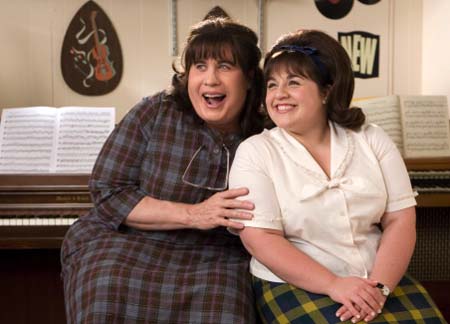 As soon as I heard about Marc Shaiman’s contribution to the songs for this musical, I definitely wanted a copy of the album. If he could make memorable tunes for what appeared to be the big South Park cash out of 1999, then he would capture the spirit of John Waters’ 1988 favorite. Although it’s not full of profanity as South Park, the double entendres and jabs at old mindsets are its strength. Hairspray stands out as one of the better conversions for Broadway unlike The Wedding Singer and Totally Blonde. Then again, the films that worked were good to begin with: Dirty Rotten Scoundrels, The Producers and the Monty Python collection.
As soon as I heard about Marc Shaiman’s contribution to the songs for this musical, I definitely wanted a copy of the album. If he could make memorable tunes for what appeared to be the big South Park cash out of 1999, then he would capture the spirit of John Waters’ 1988 favorite. Although it’s not full of profanity as South Park, the double entendres and jabs at old mindsets are its strength. Hairspray stands out as one of the better conversions for Broadway unlike The Wedding Singer and Totally Blonde. Then again, the films that worked were good to begin with: Dirty Rotten Scoundrels, The Producers and the Monty Python collection.
Then came the laziness of Hollywood to make it a movie again. Besides casting people to bring in tweeners (Zac Efron and Amanda Bynes), the producers went with John Travolta in a fat suit to play the role Divine and Harvey Fierstein did better. Well, Somara wanted to rent it but I agreed only if the original John Waters movie was available, thankfully it was.
How is the original 1988 movie? Pretty solid. I really loved it because it demonstrated Waters’ skill as a filmmaker and story teller. For years, he had usually been dismissed as some gay degenerate or a favorite of pretentious film geeks. Despite having a larger budget, he stayed true to the themes of his past work—the triumph of the underdog over the status quo. An overweight girl becomes popular and wins the handsome boy, Blacks get an equal opportunity to be on a dance show with Whites and a morbidly obese woman gains the courage to be herself. Waters was also adept at casting: Divine (his last major appearance), Sonny Bono, Debbie Harry, Jerry Stiller (before his comeback through Seinfeld), Ricki Lake (now famous for a talk show), Colleen Fitzpatrick (now known as Vitamin C) and cameos from Ric Ocasek and Pia Zadora. The story has some big stretches in logic and time yet it wasn’t supposed to be accurate. The emphasis was on having fun, celebrating being who you are and the bigoted being punished. In short, a fairy tale with a chunky princess. I remember the movie came and went when I was in college but it enjoyed belated success as a video rental.
For the musical, the story was kept relatively the same while some characters were cut out. The writers maintained many of Waters’ touches through the songs “Nicest Kids in Town,” “(You’re) Timeless to me,” and “It Takes Two.”
Along comes the 2007 film adaptation. I thought it would have a hard time following the 1988 original but I was actually impressed. To keep the PG rating, “It Takes Two” was cut and the innuendos from “(It’s) Hairspray” were delivered in a flat manner by James Marsden. A new song was put in to take advantage of Zac Efron’s popularity for the tweeners. The adaptation’s humor is more blatant with its fat jokes and digs at segregationists for a general audience. It comes pretty close to capturing the essence of the original Waters’ vision with contemporary modifications; a greater emphasis on ridiculing the perceptions of the early Sixties (hair, astronauts, TV, etc.). My only complaint couldn’t be helped; its use of larger settings. This modification was mainly caused by the dancing and the budget. Waters shot around the real Baltimore as he does with all of his movies. Thus his locations were accurate in scale which gave it a feeling of familiarity and intimacy: Motormouth’s little record store, what a real TV studio looks like, so on. It’s only something I noticed, it didn’t seriously detract me from enjoying the 2007 version.
